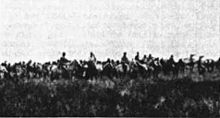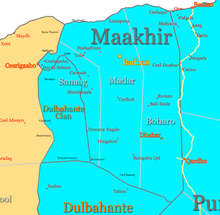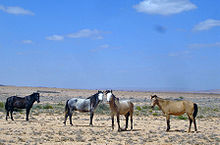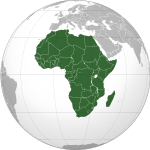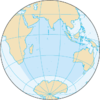- Maakhir
-
Maakhir State of Somalia ولاية ماخر الصومال

Flag Coat of arms Anthem: Somalia Tosow 
Capital
(and largest city)Badhan Official language(s) Somali and Arabic Government Federal State within Somalia - President Jibrell Ali Salad - Vice-President Ahmed Guure Adan Autonomy from Somaliland and Puntland - Proclaimed 1 July 2007 - Government Dissolved 6 April 2008 - Rejoined Puntland 11 January 2009 Area - Total 35,000 km2
13,514 sq miPopulation - estimate 700,000 Currency Somali shilling ( SOS)Time zone EAT (UTC+3) - Summer (DST) not observed (UTC+3) Internet TLD .so Calling code 252 (Somalia) Maakhir (Somali: Goboleedka Maakhir; Arabic: ماخر Maakhirian), officially the Maakhir State of Somalia (Somali: Maamul Goboleedka Maakhiran, Arabic: ولاية ماخر الصومال Wilaayatul baladul Maakhir balad- aṣ-Ṣūmmāal) was an autonomous region in northern Somalia in an area disputed by the Somaliland and Puntland macro-regions. In January 2009, it was incorporated into Puntland.[1]
Contents
Autonomy
Maakhir was a self-proclaimed state that formally represented the political will of ethnic Warsangali-Darod from the North and South in federal Somalia.[citation needed] It is the indigenous territory of the Warsangali, a member of the Harti confederation of clans (along with the Dhulbahante and Majeerteen) of the Darod. The Warsangali were originally one of the principal actors in the creation of the Puntland State as a successor to the Harti Sultanates after the collapse of the central government in Somalia in 1991. However, since the proclamation of an autonomous Puntland in 1998, the Warsangali have been increasingly sidelined as the Majeerteen clan has assumed a hegemonic role in the state.[2] Maakhir was brought back into the Puntland fold by General Abdullahi Ahmed Jama ‘Ilkajir’ , who contested the Puntland election. General Ilkajir became the de-facto leader of Maakhir following the dissolution of the Maakhir administration.
Maakhir State proclaimed autonomy at a 1 July 2007 ceremony in Badhan in response to overlapping claims of both Somaliland and Puntland over the western Sanaag and western Bari, both of which have led to several gun battles over control of the territory between Somaliland and Puntland.[3] Puntland and Somaliland have both signed oil concessions in this part of Sanaag,[4] without the consent of the local leadership,[5] which also contributed to the desire of the local Warsangali to administer their own affairs, as well as resolve disputes with Mohamud Muse Hersi, the former President of Puntland.[6] In addition to most of Sanaag.
Maakhir's form of self-governance like Puntland rested on the building block model of Federal Somalia—endorsed by the International community, a bottom-up approach of reconstituting the Somali Republic. This self-governing model which mandates a decentralized local levelof government in Somalia is seen as a workable long-term political strategy in resolving inter-tribal conflicts and ending a general disorderliness.
Maakhir built institutions such as civil society, law enforcement, xeer (customary law), and Shariah-based district courts. It also established a local military and naval establishment that protects the region's marine and land resources and which provides safety and access to the flow and supply of humanitarian aid, the normal operation of international and local NGOs, as well as the implementation of UNDP programs. Maakhir's other stated aim was to provide much-needed public services by opening up a treasury office in Badhan, to ensure governance structures for the safety and maintenance of Laasqoray Port, and the protection of private local enterprises whose operational management and ownership fall under the guidance of the private sector of Maakhir state.[7] A third objective was to manage the complex local conflicts by strengthening the already existing traditional mechanisms, which will be consolidated and run by the Department of Justice.
Maakhir sought to structure consensus around peace, internal security, market stability, cooperation and unity of purpose with its neighbors; and build bridges of trust and social harmony across dividing political lines and between opposing interests and groupings.
Neither Somaliland or Puntland ever recognised the state. Despite rumored talks with Ali Mohammed Ghedi, the former Prime Minister of Somalia, the Transitional Federal Government of Somalia declined to comment on the status of Maakhir and regarded Puntland as the official authority of the region.[8]
History
Maakhir State of Somalia was the descendant of the Sultanate of Mohamoud Ali Shire (Warsangali Sultanate) which is the oldest sultanate in Somalia with a rich history and heritage. The old capital of the Warsangali sultanate was Las Khorey.
The Sultanate of Mohamoud Ali Shire was considered by colonial authorities as having largely hegemonic authority over the other Harti sultanates, and the Warsangali played a large role in 19th century administration of Italian and British Somaliland. As the 20th century began however, the British and Italians ended the independence of the semi-independent Sultanates, and the Harti Confederation was dissolved in the midst of Italian and British rule, ending the traditional role of the Warsangali. Sultan Mohamoud Ali Shireh was exiled to the Seychelles – "the islands to which many prominent anti-colonial leaders used to be exiled".[9]
After independence, the Majeerteen emerged as the leaders of the Harti group following the USP's merger with SYL—active political parties on the eve of Somali independence. The Warsangali have however maintained their preeminent position as the traditional leaders of the Harti. This has challenged Puntland's attempts to assert its authority in Sanaag and western Bari.[10]
Disputes with Puntland
The disputes between Maakhir and Puntland had centered around ex-Puntland president Adde Musa's exploration deals with Range Resources, a mining and oil corporation registered in Australia and his refusal to recognize Maakhir's declaration of autonomy. Despite intensive gun battles at the border, Puntland state insisted that the territory was part of its sphere of influence. Moreover, Puntland continued to carry on business as usual, when such business was exactly what caused the Declaration of autonomy in the first place.
Conflicts with Puntland over charcoal
Maakhir banned charcoal production due to the desertification it causes to the fragile Somali environment. Puntland had ignored the ban and sent several expeditions into Maakhir, with Puntland militia protecting the charcoal traders. Clashes between Puntland militias escorting charcoal traders and Maakhir militias attempting to stop charcoal production had occurred numerous times since the ban, in Mijayahan,[11] Wa'iye and Sarmanyo.[12]
Puntland maintained its public statement that it did not recognize Maakhir.[13] The demand for charcoal from Arab states of the Persian Gulf, sometimes referred to as the "Black Gem" due to its profitability, has fueled the clashes.
In order to contain the charcoal expeditions, most of which are heavily armed and backed by big business interests, the Maakhir authority created a volunteer patrol force, the "Environmental Protection Corps".[14]
Blockade of Bosaso
A dispute with Puntland over the arrest of prominent Warsangeli businessmen from Bosaso prompted the Maakhir government to blockade the highway to Bosaso until the men were released.[15]
Somaliland military incursions
On February 25–26, 2008, a Somaliland-aligned, well armed force laid siege to Hadaftimo, causing a brief state of emergency before the force withdrew back to western Erigavo. Maakhir authority responded with a military buildup in the Maakhir-controlled part of Erigavo.[citation needed]
Hostilities re-emerged on July 9, 2008, when Somaliland invaded and occupied Laas Qoray port for few hours, under the pretext of a rescue mission (German citizens were allegedly being held hostage in Laas Qoray by pirates).[16]
Puntland incorporation
In January 2009, Maakhir was officially incorporated into Puntland.[1]
Administrative divisions
Maakhir claimed the following administrative divisions currently regarded under its control:
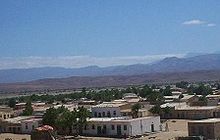 Laasqoray, Maakhir, Somalia
Laasqoray, Maakhir, Somalia
- Madar
- Badhan - capital of Maakhir
- Hadaaftimo
- mindi-gale
- Habar-shiro
- Hingalol
- Las Khorey
- Yube
- Ceelbuh
- Laako
- Sanaag
- Ceerigaabo - regional capital
- Damala Xagare
- Carmale
- Geilwiete
- Darasalaam
- Shimbiraale
- Ceelaqoday
-
- Buraan - Maakhir Authority is planning to open a University in this city.
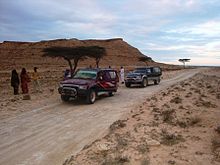 Hadaaftimo, Maakhir, Somalia
Hadaaftimo, Maakhir, Somalia
Cities and towns
The biggest cities in the area claimed by Maakhir Authority are Badhan, Las Khorey, Dhahar, Buraan, Hadaftimo, Yubbe, Hingalol, Damalla-Hagare, Eilbuh and Erigavo.
Politics and government
Parliamentary Seats
As Somalis are a largely nomadic people, parliamentary seats are designated by lineage and clan, this being their constituency.[citation needed] Warsangeli Seats Subclan Seats Location Adan Sa'iid 4 Hadaaftimo,Badhan, Laasqoray,mashaxaleed. central and Coastal sanag Bah-Majeerteen 3 Badhan,Laasqoray, Eilbuh, Hadaaftimo, Central Sanaag Gashanbur 2 Buraan, East Sanaag Warlabe 1 Badhan,Eilbuh,Laasqoray,Rad,Laako,Durduri, CentralAnd Coastal Sanaag Ogayslabe 2 Badhan, Hadaaftimo, ceerigaabo,Lasqoray,Coastal Sanaag Reer Saalah 1 Midigale,Xingalool,Badhan, Buraan, Habar-shiro, Central Sanaag Muhumud 1 Shinbirale, Western Sanaag Rer Faatah 1 Laasqoray,Badhan, Central Sanag respectively) Nouh Omar 2 Erigavo,Yubbe,Gelweyte, near Mait, North Sanaag Bahogayslabe 1 Erigavo, Carmaale, Damale Haggare, Western Sanaag Bahidoor 1 Hingalool, South Sanaag Jibrel Sa'iid 1 Erigavo,Darasalaam, Western Sanaag Adan Yakub 1 Hingalool, South Sanaag Dubays 9 Dhahar, Elayo, Bosaso, Galgala in Eastern Sanaag Awramale 5 Kismayo, Bulo Haji Other Seats Minority Group Seats Location Women 5 Not specified Dir clans 2 Laasqoray, Erigavo The disputed status between Puntland and Somaliland has also meant that Sanaag as a whole may not have received all the available and apportioned aid from UN non-governmental organizations (NGO)s and aid agencies. The newly established Maakhir government has made this issue one of their first priorities, and appealed to the Warsangali Diaspora for assistance.[17]
Government
Due to drought conditions, administrative problems and threats of invasion from Somaliland, the government of Maakhir was dissolved on the 6th of April 2008 by governmental and presidential decree. President Jibril promised a new government by June 2008, but Warsangelis decided instead to rally behind the campaign to elect General Ilkajir as President of Puntland. By the swearing in of the new president of Puntland, Abdirahman Mohamud Farole, Maakhir had fully rejoined Puntland.
The two branches of government in Maakhir (the Parliament and the Executive) were led by:
- President Jibril Ali Salad - President of Maakhir
- Eng. Ahmed Guure Aadan - The House of Representative Speaker
State secretaries
Maakhir State of Somalia had 17 State secretaries.
Former President Salad has appointed seven people to his cabinet on the 4 August 2007,[18] Mr. Ahmed Sheikh Salah resigned from cabinet due to health reasons, and four more secretaries were added on September 8, 2007, then another seven on September 8, 2007[19] establishing the following State Secretaries (called Xoghayaashan in Somali):
- Mr. Ahmed Hussein Yuusuf - Secretary of State for Interior and Security Department
- ENG Saeed Adan Saeed - Secretary of State for Housing.
- Mr. Ahmed Faarah Ali - Secretary State for Finance and Commerce.
- Mr. Iimaan Haji Warsame Faarah - Secretary of State for Environment.
- Mr. Mohamud Mohamed Iise - Secretary of State for Social and Labor & Employers affairs.
- Mr. Sa'iid Du'aale Mohamed - Secretary of State for Transports.
- Mr. Sadik Abdi Misan - Secretary of State for Natural Resources
- Mr. Ali Sa'iid Osmaan Qodah - Secretary of State for Trade and Manufacturing
- Mr. Abdurrahman Sa'iid Ahmed - Secretary of State for International Relations
- Prof. Ali Abdurrahman Hirsi - Secretary of State for Federal relations
- Prof. Mohamed Ali Mohamed - Secretary of State for reconciliation and peace affairs.
- Mr. Omar Liibaan Arab - Secretary of State for justice and Religious affairs.
- Ms. Zainab Ismaa'iil Mohamed - Secretary of State for Family welfare.
- Dr. Ahmed Ali Mire - Secretary of State for Agricultures and Livestock
- Mr. Abdulkadir Mohamed Sa'iid - Secretary of State for Fishing and marine resources.
- Eng. Abdirizak Ali Mohamed (Black) - Secretary of State for Media and Culture.
- Mr. Ali Mohamud Nuur (Ali Sanaag) - Commander of Maakhir Police Forces.
The Parliament of Maakhir had 38 members.[20]
Recognition
Maakhir had received legitimate political support from Asha Abdalla, who represented Sanaag in the Transitional Federal Parliament.[21] The state was never formally recognized by the TFG as a whole.
See also
- Somaliland-Puntland dispute
- Maakhir Coast
References
- ^ a b Worldstatesmen - Maakhir
- ^ The Formation of Maakhir State of Somalia
- ^ Somaliland Warns Puntland Either To Withdraw Militia Forces Or Face Immediate Consequences
- ^ Puntland Oil & Mining Deal: The Offspring of an affair between greed and incompetence (Part I)
- ^ Puntland Oil and Mining Deal: (Part II)
- ^ The rise of Maakhir State and the fall of Puntland.
- ^ Laas Qorey Port Operation.
- ^ Maakhir State of Somalia faces challenges and obstacles. Article in Markacadeey online on August 23, 2007.
- ^ A Touching Glimpse of History and the Reunion of a Somali Royalty
- ^ Somalia: Breaking into even smaller bits -by the Economist
- ^ Fighting Erupts As Invading Militia From Puntland Are Beaten Back By Somalilanders
- ^ Gun battle between Puntland Supported Militia and Maakhiri Forces in Southern Sanaag
- ^ Puntland Opposes `Makhir State'
- ^ Environmental Protection Corps in Maakhir State of Somalia
- ^ Tensions build up in Northeastern Somalia « maakhir.com
- ^ CIIDAMADA SOMALILAND OO DHAAWAC U GAYSTAY MID KA MID AH DADKA XUSUL DUUBKA UGU JIRA SII DAYNTA DADKA AFDUUBKA LOO HAYSTO. (Sorry not reported in English)
- ^ Jibrell has called the Diaspora to reach out to increasing IDPs in Sanaag and establish Civil Society Organisations
- ^ Maakhir State of Somalia names State Secretaries
- ^ Maakhir State of Somalia names 7 new State Secretaries
- ^ Maakhir State of Somalia increases its Parliament members
- ^ "Maakhir State gains support in Somalia parliament". Laasqoray.net (Garowe Online). 2007-09-05. http://www.laasqoray.net/view_article.php?articleid=1252. Retrieved 2007-11-21.
 SomaliaCapital: Mogadishu
SomaliaCapital: MogadishuTopics Maritime history · Laas Gaal · Land of Punt · Walashma dynasty · Warsangali Sultanate · Adal Sultanate · Ajuuraan State · Dervish State · Gobroon Dynasty · Majeerteen Sultanate · Sultanate of Hobyo · Italian Somaliland · British Somaliland · Ogaden War · Somalian Revolution (1986–1992) · History of Somalia (1991–2006) · Somali Civil War · Unified Task Force · Piracy in Somalia · War in Somalia (2006–2009) · War in Somalia (2009–)Architecture · Art · Cinema · Cuisine · Languages · Literature · Music · Christianity · Islam · Sports · Coat of arms · Flag · National anthemPost-war divisions Declared statesIslamist administrationsFormer administrationsProposed statesPre-war divisions Awdal · Bakool · Banaadir · Bari · Bay · Galguduud · Gedo · Hiiraan · Jubbada Dhexe · Jubbada Hoose · Mudug · Nugaal · Sanaag · Shabeellaha Dhexe · Shabeellaha Hoose · Sool · Togdheer · Woqooyi GalbeedCountries and territories bordering the Indian Ocean Africa Comoros · Djibouti · Egypt · Eritrea · France (Mayotte and Réunion) · Kenya · Madagascar · Mauritius · Mozambique · Rodrigues, Mauritius · Seychelles · Somalia · Somaliland (Unrecognized) · South Africa · Sudan · Tanzania · Zanzibar, TanzaniaAsia Bahrain · Bangladesh · British Indian Ocean Territory (Chagos Archipelago), United Kingdom · Burma · Christmas Island and Cocos (Keeling) Islands, Australia · India · Indonesia · Iran · Iraq · Israel · Jordan · Kuwait · Malaysia · Maldives · Oman · Pakistan · Qatar · Saudi Arabia · Sri Lanka · Thailand · Timor-Leste · United Arab Emirates · YemenOther Categories:- Divided regions
- Geography of Somalia
- States of Somalia
- States and territories established in 2007
- Territorial disputes of Somalia
- Madar
Wikimedia Foundation. 2010.

